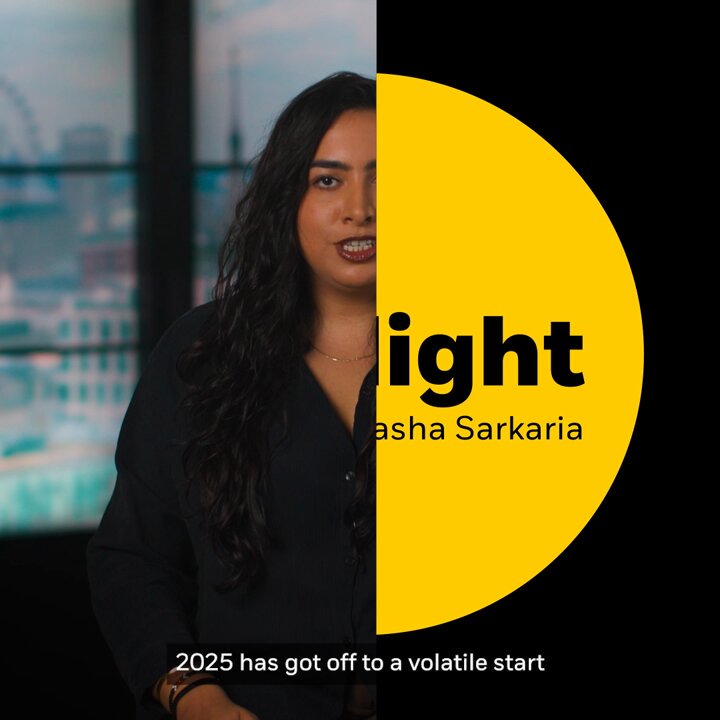THIS VIDEO IS MARKETING MATERIAL
Capital at risk. The value of investments and the income from them can fall as well as rise and are not guaranteed. Investors may not get back the amount originally invested.
2025 has got off to a volatile start in markets, with the first few months of the year marked by geopolitical and policy uncertainty, concerns about slowing US economic growth, and a shift in market leadership towards European stocks.
Looking ahead, we think uncertainty will remain high and could be a defining feature of 2025, but we still see potential opportunities.
Firstly, we see room to run for European stocks. Tailwinds from changes to government spending policies – particularly in Germany – have helped to fuel stronger sentiment towards European stocks. For the next leg of the trade, we look to corporate earnings growth, implementation of the new spending policies, and the potential for reduction in geopolitical risk. It’s also worth noting that European stocks still look significantly cheaper than their US peers, based on their price-to-earnings ratio, even though this gap has closed from the all-time highs we saw at the start of the year.
Turning to bonds, we continue to see potential opportunities for investors to generate income. We like bonds issued by UK companies that have a quality tilt – that is, those with strong balance sheets, which appear relatively well-placed to repay this debt. In our winter outlook, we spoke about ‘duration’ – that is, the length of time until a bond matures and the investor is repaid – and outlined how the yield, or interest rate, available from short-duration UK government bonds, or ‘gilts’, was comparable to the yield available from longer-duration gilts. The same is currently true for UK corporate bonds, so investors could access similar income levels from short-duration exposures, without taking on the higher level of risk around interest rates, economic growth and various other factors that could impact the value of longer-duration bonds.
Finally, with geopolitical uncertainty remaining high, we look to asset classes with low correlations to stocks and bonds, which might be able to boost portfolio diversification. Gold is one asset that we think could play a role as a diversifier for geopolitical risk – as it has done over the past eighteen months. We acknowledge that gold prices have risen significantly, but we think the downside risk could be cushioned by ongoing demand from central banks.
See our latest report, Turning views into action, for more.
This video is marketing material: Before investing please read the Prospectus and the PRIIPs KID available on www.blackrock.com/it, which contain a summary of investors’ rights.
Risk Warnings
Capital at risk. The value of investments and the income from them can fall as well as rise and are not guaranteed. Investors may not get back the amount originally invested.
Past performance is not a reliable indicator of current or future results and should not be the sole factor of consideration when selecting a product or strategy.
Changes in the rates of exchange between currencies may cause the value of investments to diminish or increase. Fluctuation may be particularly marked in the case of a higher volatility fund and the value of an investment may fall suddenly and substantially. Levels and basis of taxation may change from time to time and depend on personal individual circumstances.
Important Information
In the UK and Non-European Economic Area (EEA) countries: this is issued by BlackRock Investment Management (UK) Limited, authorised and regulated by the Financial Conduct Authority. Registered office: 12 Throgmorton Avenue, London, EC2N 2DL. Tel: + 44 (0)20 7743 3000. Registered in England and Wales No. 02020394. For your protection telephone calls are usually recorded. Please refer to the Financial Conduct Authority website for a list of authorised activities conducted by BlackRock.
In the European Economic Area (EEA): this is issued by BlackRock (Netherlands) B.V., authorised and regulated by the Netherlands Authority for the Financial Markets. Registered office Amstelplein 1, 1096 HA, Amsterdam, Tel: 020 – 549 5200, Tel: 31-20-549-5200. Trade Register No. 17068311 For your protection telephone calls are usually recorded.
In Italy: For information on investor rights and how to raise complaints please go to https://www.blackrock.com/corporate/compliance/investor-right available in Italian.
For investors in Israel
BlackRock Investment Management (UK) Limited is not licensed under Israel's Regulation of Investment Advice, Investment Marketing and Portfolio Management Law, 5755-1995 (the “Advice Law”), nor does it carry insurance thereunder.
For investors in South Africa
Please be advised that BlackRock Investment Management (UK) Limited is an authorised Financial Services provider with the South African Financial Services Conduct Authority, FSP No. 43288.
Any research in this video has been procured and may have been acted on by BlackRock for its own purpose. The results of such research are being made available only incidentally. The views expressed do not constitute investment or any other advice and are subject to change. They do not necessarily reflect the views of any company in the BlackRock Group or any part thereof and no assurances are made as to their accuracy.
This video is for information purposes only and does not constitute an offer or invitation to anyone to invest in any BlackRock funds and has not been prepared in connection with any such offer.
© 2025 BlackRock, Inc. All Rights reserved. BLACKROCK, BLACKROCK SOLUTIONS and iSHARES are trademarks of BlackRock, Inc. or its affiliates. All other trademarks are those of their respective owners.










